Credits
Feature by: Tom Huddleston
Posted on: 17 June 2007
Related articles:
Features: What is Animation?
America has never been particularly comfortable with satire. A gentle poke at the powers that be is allowed, even encouraged — witness the success of good-natured softies like Jon Stewart or The Simpsons, nudging decency in the ribs and tipping a wink to the audience. But genuine, hard-hitting satire is frowned upon: somebody might really be offended, and nowhere in the Constitution does it allow for that. There’s no American equivalent of British figures like Peter Cook or Christopher Morris, authentic anti- establishment comics who nonetheless achieved mainstream success. Even so—called ‘dangerous’ American figures like Lenny Bruce and Richard Pryor kept their comedy largely personal. Topics like religious extremism, sexual abuse, disability, and AIDS, questions on the efficacy of democracy or America’s role in history and the world, these were never acceptable topics for comedy in any mainstream venue.
Until in 1997, an animated show began that would eventually break all boundaries of accepted decency on television, and manage over the course of ten years to offend just about every living person on the globe, including me. There are moments of true horror in South Park, images and viewpoints so extreme you can almost hear the complain and creak of boundaries being stretched. But there’s also clear-headed insight and inarguable intelligence, a bull-headed determination to resist censorship, and a quality of writing unparalleled in American comedy.
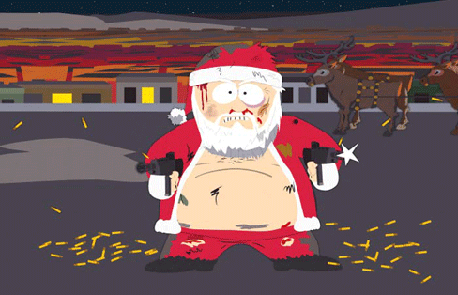
Like its precursor The Simpsons, South Park’s rise to fame was meteoric. By the show’s second Christmas in 1998 the must-have toys were figurines of the four central characters, and Isaac Hayes’ single in character as Chef, ‘Chocolate Salty Balls’, went straight to No. 1 in the UK charts. I was working in a Virgin Megastore that year, and the sheer quantity of South Park merchandise was astounding — the fluffy dolls, the books, the CD’s, Eric Cartman mousemats, Big Gay Al keyrings. Very quickly, the show became the modern equivalent of the Richard Pryor and Derek & Clive albums of the 1970’s, or Eddie Murphy’s Delirious and Raw on VHS in the 1980’s — something for pre-adolescent boys to sneak off and enjoy furtively, for teenagers and students to flaunt as a badge of rebellion and cultural savvy. One had to wonder whether the parents (and especially the grandparents) who shelled out for this avalanche of filth-based memorabilia knew exactly what they were buying—there was a daycare centre near my house called South Park Nursery, with hardwood cutouts of the four main characters proudly displayed in the front garden. Had the proprietors even watched the show, or did they just see four cute, popular cartoon characters and run with it?
The irony was that, again mirroring The Simpsons, the show in its early stages was fairly unremarkable. South Park fever was driven by controversy and by the shock of the new—we’d never heard cartoon characters talk like this before, at least not on prime time TV. Gay dogs and anal probes, obscenity and casual racism, broad swipes at celebrity culture and political hypocrisy, an endless, gushing torrent of scatological humour. Another predominant facet of the show’s appeal was the rough-and-ready nature of its presentation — the shoddy but intriguing content warning (‘this show… should not be watched by ANYONE’), the cookie-cutter animation, which might have been constructed in somebody’s garden shed. It was DIY, punk rock, three chords and no frills. But it was also rather formless, uncertain, eager to please but lacking in confidence, and exhaustively lowbrow — there are only so many times you can find farting funny, eventually it just becomes tiresome (though, as the writers were keen to point out, if you keep doing it sooner or later it becomes funny again. Circle of life). By the end of the second season the novelty was wearing off, and although the show had amassed a solid fanbase the prevailing wisdom was that South Park was, at heart, adolescent filth, amusing in its way but essentially forgettable. And in some quarters this perception holds today: in the UK the show hasn’t been given a prime time slot in over five years.
It was the release and subsequent critical and commercial success of the show’s feature film spinoff, the unimaginatively titled South Park: Bigger, Longer And Uncut, in 1999 that heralded the show’s artistic rebirth. The film marked a quantum leap forward as writers for Parker and Stone, thrusting the show’s satirical aspects to centre stage, as an argument over censorship provokes a land war between the U.S. and Canada. For the first time the creators recognised that just because the show could be intelligent and provocative didn’t mean they had to tone down the fart jokes—in fact, the one complemented the other. The film’s critical success also proved that the key to long term success would have to be actual creative development. South Park didn’t just have to be funnier, it had to be better—the animation would have to advance, the characters would have to be more clearly defined, with real goals and recognisable traits, likes and dislikes. The show would have to work on multiple levels simultaneously, even if it meant alienating those adolescent fans who tuned in every week just for the swearing.
The improvement was instantaneous. The first episode of South Park’s third season, ‘Rainforest Schmainforest’, uses a now familiar Parker/ Stone ploy, taking a well established socio-political truism (in this case ‘rainforests are good’) and turning it on it’s head: how would all those tree-hugging hippies who ramble on about saving the rainforest feel if they were actually lost in one? And as the season continues the quality barely dips, taking on the religious right in ‘Starvin’ Marvin in Space’, meaningless toy fads in ‘Chinpokomon’, combining a commentary on small-town small-mindedness and homophobia with a dig at the ATF post-Waco in ‘Two Guys Naked in a Hot Tub’.
For the next five years the show scarcely faltered, gaining in confidence and taking on larger and more hazardous subjects—religion and disability in ‘Do the Handicapped Go to Hell?’, racism and recrimination in ‘The Death Camp of Tolerance’ and ‘Cartman’s Silly Hate Crime’, the 2004 election in ‘Douche and Turd’, the wars in Iraq and Afghanistan in ‘I’m a Little Bit Country’, ‘Red Sleigh Down’ and ‘Osama Bin Laden Has Farty Pants’, which scrutinized the ongoing conflict through the filter of WW2 propaganda, particularly those outrageous buck-toothed Bugs Bunny anti-Japanese cartoons. But amidst all the crusading, there has always been space for gentler episodes which let the kids just act their age — setting out on a dangerous quest in ‘The Return of the Lord of the Rings to the Two Towers’, using a cool Island song to persuade George Lucas not to recut Raiders of the Lost Ark in ‘Free Hat’, being bored to tears by Cirque du Soleil in ‘Quintuplets’.
For these six seasons South Park stood head and shoulders above all other American comedy, animated or otherwise. If nothing else, the show was simply funnier than anything else on offer, joke-for-joke perhaps the finest comedy the country has ever produced, thanks to a combination of supreme writing and a willingness (and licence) to say things no one else would get away with saying. Trying to narrow down a list of worthy quotes to illustrate the genius of South Park is no easy task. One thinks of Jennifer Lopez singing to her fiancé “I love you Ben, you almost make me forget about Tacos”: offensive on so many levels, it’s also comedy approaching genius. Or the moment Krishna turns into a beaver so that he can chop wood for Jesus, Master Carpenter, to build a mould for a giant stone John Wilkes Booth which Mohammed can bake dry with his fire-hands and Lao Tzu can bring to life with the power of his mind. Or the mountain lion cubs scampering joyfully around the spreadeagled legs of a young mother as they learn to perform abortions so that they can prevent the impending birth of the Antichrist. Or Santa Claus in an Iraqi prison (“you shocked Santa’s balls!”), or Towelie the permanently stoned, genetically engineered towel, or the Native American comedy club (“HA- hahaha HA- hahaha”), or any of the many, many times Cartman starts singing. In fact, Trey Parker may be the first comic since the heyday of Monty Python to consistently write effective, humorous songs, in a seemingly inexhaustible range of styles (a far cry from The Simpsons’ repetitive Broadway showtune addiction). There’s the Christian rock stylings of Faith +1 (“Gonna get down on my knees and start pleasin’ Jesus…”), the hi-NRG chart pop of Fingerbang (“I want to finger bang-bang you into my life”), from backwoods bluegrass (“You do a line and I’ll do a line, honey”) and shimmering 30’s Noel Coward music hall jazz (“I’ve got something in my front pocket for you”) to an entire folk-rock musical about the adventures of a lemming stuck up Mr. Slave’s ass. Best of all are the pastiches of popular artists, like the aforementioned J- Lo with Taco Flavoured Kisses, or Alan Jackson’s attempts to cash in on 9/11 with his unique brand of heart-tugging country pop (“Where were yew… when they built that ladder to heaven? Did it make you feel proud, or did you think it was kinda gay?”)
But the show has other strengths—over the years the animation has improved immeasurably (to the chagrin of some purists), and the character development has been equally successful, resulting in the inexorable rise of one of the most complex and terrifying psychopaths in television history – Eric Cartman. his single-minded pursuit of his own selfish goals was played largely for laughs throughout the first few seasons – he was the mean-spirited fat kid, spoiled and self-absorbed but essentially harmless. There were moments of concern—the relish he took whenever a flicker of authority came his way, his willingness to rat out his friends even when his own life was in danger. But then Season Five kicked off with ‘Scott Tenorman Must Die’, and the rules were changed forever. In this episode Cartman, faced with continuous humiliation by his nemesis, the eponymous 6th Grader, develops the most heinous of all revenge strategies, and executes it with cold and flawless precision- Scott’s parents are lured to a remote field, murdered, cooked into chilli and fed to Scott at a chilli cookoff to which Scott’s favourite band, Radiohead, have also been invited. The episode ends with Radiohead leaving in disgust at the ‘little cry-baby’, as Cartman licks the tears from Scott Tenorman’s face:
CARTMAN: Yummy, yummy, you guys. The tears of unfathomable sadness!
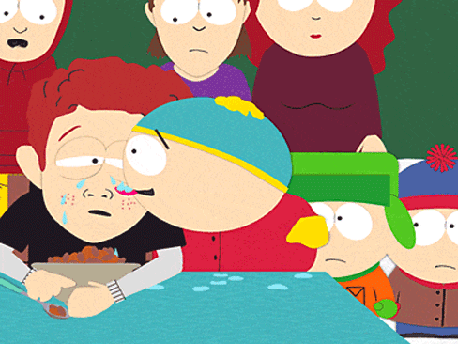
Since the Scott Tenorman incident, Cartman’s psychosis has only deepened, from having his left hand possessed by Jennifer Lopez (and runaway con artist Mitch Connors) to attempted murder with a whiffle-ball bat when Kyle threatens to rat him out.
Stan and Kyle act largely as proxy characters for the show’s creators, though each has developed throughout the show’s run. Now freed from the Machiavellian clutches of Wendy Testaburger, Stan has become the moral centre, firm in his beliefs even when the world is falling apart around him. Kyle is the focus of doubt in the show, always plagued by guilt and questions, willing to follow anyone who promises to rid him of a yawning inner emptiness. Parker and Stone’s depiction of childish fear and ignorance is heartfelt, and often acts as a welcome counterpoint to the wider issues up for discussion: celebrated episode ‘The Passion of the Jew’, which deals with the question of anti-Semitism in Mel Gibson’s Jesus film, would lack much of its impact if it weren’t filtered through the guilt- ridden eyes of Kyle, who comes to believe that his people really do owe the world an apology for killing Christ.
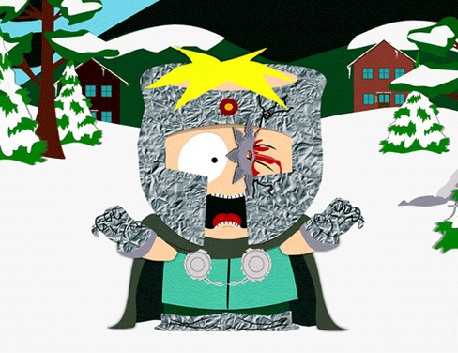
Then there’s a raft of classic supporting characters, from decent, down-to-earth folks like Chef, Mr. Mackie, and Jesus, to bug-eyed lunatics like Officer Barbrady and Mr. (now Mrs.) Garrison. Of the parents, Randy Marsh is the most convincingly developed as a character, his seething homosexual leanings and boyband past hidden beneath a thin veneer of familial respectability and barely controlled alcoholism. The kids, by contrast, are relatively normal — even initially stereotyped characters like handicapped standup Jimmy and paranoid Tweek become part of the gang in due course. The most memorable has to be Butters, the lovable innocent, perhaps the most unfortunate and put upon character on television — in one episode alone (‘Good Times with Weapons’) he is severely wounded in the eye with a throwing star, covered in hair and glue, disguised as a dog and abandoned in the snow before being mistaken for an actual dog and thrown into an animal shelter where he’s repeatedly peed and shat on. In other episodes he’s sold to Paris Hilton by his parents, exposed to pornography so hardcore that he loses his mind, is locked in an underground fallout shelter for a week and forced to wear false testicles on his face so he can go on daily talk shows.
BUTTERS: I always fall asleep to the sound of my own screams. Then I always get woken up in the morning by the sound of my own screams. Do you think I’m unhappy?
For the past two seasons, the working practices behind South Park have been altered, bringing about a sea change in the show’s fortunes and notoriety. South Park is now the first authentically topical cartoon show, written and animated inside of a week so that the creators can keep up to date with current events, leading to episodes like ‘Two Days Before the Day After Tomorrow’ about the disaster of Hurricane Katrina, or ‘Cartoon Wars’ which dealt with the Mohammed cartoon furore. But in 2005 the episode ‘Trapped In The Closet’ took on the Church of Scientology in the most confrontational manner imaginable, not only offending the organisation’s most high profile members like Tom Cruise and John Travolta (‘oh my gahd!’), but calling the Church’s entire ethos and culture into question, taunting them to react:
STAN: I’m not the reincarnation of L. Ron Hubbard, and Scientology is just a big fat global scam.
SCIENTOLOGISTS: You think you can say our religion is a lie? We’ll sue you, buddy. You are so sued. You can’t make fun of Scientology, kid. We are gonna sue you, and your boss. How dare you mock our faith, you little punk? You’ll be hearing from our lawyers tomorrow.
STAN: Well, go on then, do it. I’m not scared of you. Sue me.
The incident called worldwide attention to the show for the first time in years. The Catholic Church soon joined in, protesting over an episode, ‘Bloody Mary’, in which a statue of the Blessed Virgin shits blood in the new Pope’s face, though Trey Parker himself admitted he could understand why people were offended by that one. Things came to a head with 2006’s ‘Cartoon Wars’, in which a brief glimpse of the prophet Mohammed was shoehorned into an episode attacking the rival cartoon series ‘Family Guy’. But the image was blacked out by Comedy Central, fearing a backlash from Moslems — never mind that the episode ‘Super Best Friends’ had featured Mohammed as a character back in 2001, as part of a league of religious superheroes which also included Jesus, Buddha, Lao Tzu, Krishna and the Mormon founder Joseph Smith, and nobody had batted an eyelid.
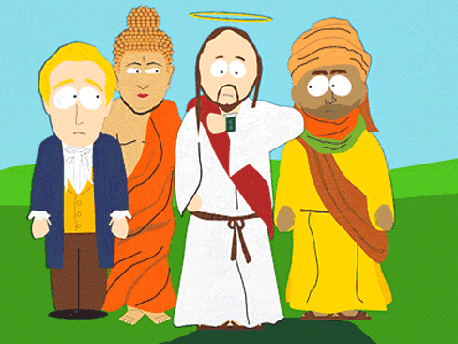
So how did South Park manage for so long to get away with courting such radical controversies? If a mainstream film or drama series depicted the Catholic Church as a society populated entirely by dedicated child molesters led by a decrepit Pontiff who worships a giant spider (as in ‘Red Hot Catholic Love’), they would not only be facing trouble from the FCC and Christian groups, but possible prosecution under laws governing discrimination and religious freedom. Similarly, if a Hollywood comedy depicted the North American Man-Boy Love Association’s pursuit of a group of eight year-olds in the style of bedroom farce complete with French accordion music and a pratfalling waiter, it would quite rightly be seen as monumental bad taste. But for years South Park had done all this and more, with nary a raised eyebrow. Only when the machinations of Tom Cruise and his fellow Scientologists drew attention to the show did religious and moral groups begin to take notice, and complain.
It’s partly a question of context. Animation has for so long been the provenance of innocent entertainment that South Park’s trangressions were easily overlooked, dismissed as harmlessly childish. Parker and Stone worked slowly, almost imperceptibly, the facile potty humour of the show’s early seasons acting in their favour — quite simply, nobody was watching. The boundaries of decency were expanded ever so gradually, starting with established satirical targets like the Catholics and the religious right before widening their horizons to take on extremists and hypocrites of all stripes, creeds and faiths.
Parker and Stone’s attacks are bolstered by a clear-headed intelligence and self-awareness absent from their peers, allowing them to walk the knife-edge between comedy and indecency with practiced skill. Allied to neither political party (to the great frustration of activists on both sides), every attack Parker and Stone make is morally inspired, heartfelt, and personal but also objectively even-handed, motivated by a high-minded willingness to expose and lampoon duplicity wherever it may hide. The episode ‘I’m a Little Bit Country’ deals with the run-up to war in Iraq in the context of clashing marches by both anti-war protesters and pro-war ‘patriots’. Neither side is left unscathed, but their differences are solved when Cartman flashes back in time to the signing of the Declaration of Independence and uncovers the great hypocrisy which underlies the entirety of U.S. history: America will always be at war, both for financial gain and self-preservation, but the Constitution also promises freedom of protest, ensuring that the national conscience can always be placated. It’s an astonishing conclusion: without the hawks the country would collapse, but without the doves they’d just be seen as warmongering criminals. At a time when the country was divided into two irreconcilable and increasingly bitter camps, only South Park was able to ignore the ongoing war of words and uncover an even greater, more disturbing lie, one which America will almost certainly never choose to face.
Another of the great joys of South Park is that the show’s attacks, particularly on shadowy or misunderstood organisations, are often backed up by a genuine desire to educate. Everything you need to know about either Scientology or Mormonism can be learned here, the writers sticking as close as possible to the facts because it’s damn close to comedy already. Other episodes stray further from the truth — it’s unlikely that the Pope does, in fact, worship the Queen Spider, or that the OJ trial was won using the Chewbacca defence.
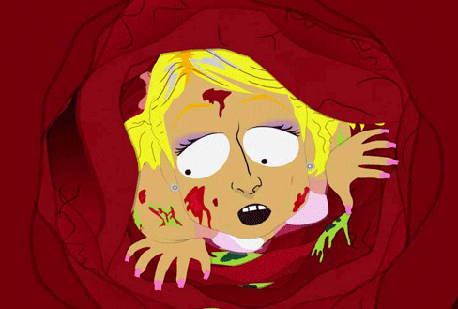
Many of the most vicious, pointed attacks in the series are reserved for celebrities — David Blaine, Steven Spielberg, and Rob Reiner have all paid the price for perceived crimes and double standards. Perhaps the most vicious celebrity attack of all can be seen in the episode ‘Stupid Spoiled Whore Video Playset’, in which Paris Hilton drinks until she vomits, drives her pets to suicide, attempts to buy poor helpless Butters and engages in a ‘whore-off’ with consummate whipping boy Mr. Slave, wherein she inserts a pineapple into her vagina and is eventually swallowed by Mr. Slave’s anus, to the delight of the gathered crowd. The episode could, and occasionally does, come across as mean-spirited — Paris is obnoxious, but she hardly seems an appropriate target for such bilious hatred. But, again, the target is wider than one person — Parker and Stone are attacking the industry that has sprung up around figures like Hilton, the culture which encourages young women to prize appearance and attitude over intelligence and self-worth, which pushes them to dress and behave like pampered heiresses.
Occasionally Parker and Stone’s fury gets the better of them. ‘The Passion of the Jew’ begins in classic fashion, as the various arguments are laid out and examined: is the film anti-Semitic? Is the bible? Is Mel Gibson? The answers are yes, probably, and yes. But then the episode moves onto a larger question: Is the film any good? It’s an appropriately lopsided South Park approach, as Stan and Kenny set off to Malibu to confront Gibson and get their admission fee back. And here the episode falls down — the writers’ hatred for the burly Australian homunculus is so intense that they can’t seem to bring themselves to deal with him at all, except as a freakish, shit-flinging madman — it’s sledgehammer satire, and less funny for it.
But this tendency to take everything personally can also be rewarding — many of the episodes are driven by a real moral fervour, an outrage against the horrors that exist in the world. The aforementioned ‘Cartman Joins NAMBLA’ does indeed depict the ravenous sexual pursuit of pre-teen boys, but the episode is steeped in a genuine sense of disgust that serves to sharpen both the comedy and the social comment. As usual, the characters of Stan and Kyle serve as proxies for Parker and Stone themselves:
NAMBLA REPRESENTATIVE: We are human. Most of us didn’t even choose to be attracted to young boys. We were born that way. We can’t help the way we are. And if you all can’t understand that, well, then I guess you’ll just have to put us away.
KYLE: Dude, you have sex with children.
STAN: Yeah, you know, we believe in equality for everybody and tolerance and all that gay stuff but, dude, fuck you.
KYLE: Seriously.
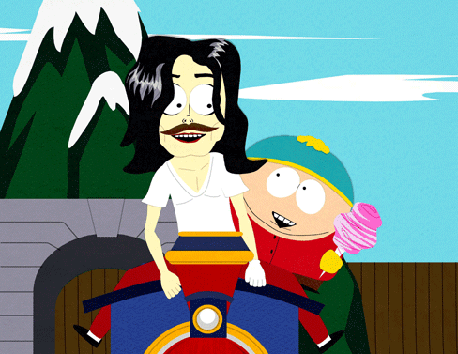
But the most reviled figures in Parker and Stone’s world, responsible for more heinous crimes than religion, government and NAMBLA put together, are the parents. In the universe of South Park, parents are irresponsible, morally wavering, easily influenced, so convinced of their intellectual superiority over their hapless offspring that they are blind to the reality of the world surrounding them. The most flagrant example of this comes in the film Bigger, Longer And Uncut, in which the mothers happily lead the U.S. into a war with Canada to protect their children from foul language, but the theme reoccurs throughout the series. In the episode ‘Cherokee Hair Tampons’, Kyle’s mother is assured of the efficacy of New Age remedies to the point where her son almost dies of a kidney infection. In ‘Child Abduction Is Not Funny’, the parents become so paranoid that their children might go missing that they have the local Chinese restaurant owner build a wall around the town to keep out potential abductors (it is instead attacked by hordes of angry Mongolians). An episode dealing with the Michael Jackson case, ‘The Jeffersons’, throws the issue into stark relief—Parker and Stone are less interested in whether or not Jackson is a child molester than his skills as a dad:
KYLE: Let’s say all the bad things said about Mr. Jefferson are lies. Let’s say the police department does just go around spending their time framing people for crimes they didn’t commit. Let’s say it’s all made up, and Mr. Jefferson is just a nice guy who’s trying to be a child because he never got to have a childhood. Well that’s fine, except that he has children now, and when people have children they have to grow up.
MR. JEFFERSON You’re right… Blanket doesn’t need a playmate. He needs a father.
In South Park, the worst thing anybody can be is a bad parent.
Occasionally the series does go too far and risks becoming a crass display of crude shock tactics—it was saddening to see Cartman’s image in that desperate parade of washed-up comics, The Aristocrats, but occasionally South Park suffers from a similarly skewed desire to horrify without real purpose. When the first episode after Isaac Hayes’ acrimonious departure, ‘The Return of Chef’, included references to child abuse and molestation, it felt like a cheap and immature attempt to send Hayes off in the most insulting way imaginable. Other recent episodes have similarly struggled — the show concerning Mr. Garrison’s sex change operation was graphically disgusting, but contained precious little insight, as did an episode concerning an argument between Oprah Winfrey’s private parts. The episode ‘Bloody Mary’ that so angered the Catholic Church made a number of supremely intelligent points about alcoholism, but was somewhat railroaded by the unnecessarily grotesque blood-shitting incident.
It’s now becoming unavoidably clear that, like The Simpsons before it, the heyday of South Park is past. In their ongoing bid to become as topical as possible, Trey Parker and Matt Stone have sacrificed some of the cool headedness and insight that made the show work — it feels rushed, because it is. There are still moments of near-genius, angles on current events that provoke us into re-learning what we think we already know. It will be interesting to see how the fallout from the Scientology and ‘Cartoon Wars’ episodes affects South Park’s ability to address serious issues — Comedy Central’s decision to censor the image of Mohammed has set a worrying precedent. But even without the threat of outside influence the show’s edge is getting blunt, the satirical swipes cheaper and more obvious. A case in point, the recent episode ‘Manbearpig’, in which former Vice President Al Gore attempts to warn the world about the increasing threat from the titular beast, which exists only in his head. The parallels are achingly clear: global warming, pollution. But the show’s take on the issue seems badly thought out — are they trying to question the now irrefutable science behind global warming, and if so, why? It feels like senseless devil’s advocating, taking the naysayer’s position just for the hell of it. It’s hard to believe Parker and Stone care much for the environmental issue either way, so why tackle it?
Perhaps it’s not too late. If Parker and Stone were willing to ignore the yes-men, sacrifice some small measure of pertinence and accept a larger workload, perhaps the show could regain it’s former standing — it’s been less than two years since the quality first began to slide. But even if things continue as they are, we still have six seasons worth of sporadic perfection, moments of stark truth and genuine insight, and better jokes than anyone else.
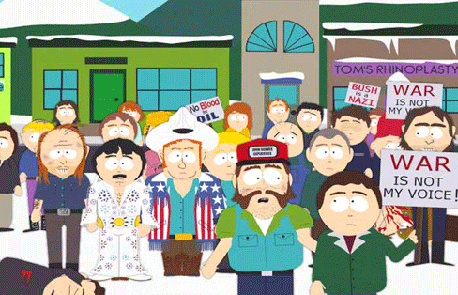
It would be remiss of me to end this article without drawing attention to one of the great questions of our age, which has pursued me through pubs and bars across the free world: which is the better show, South Park or The Simpsons? It should be clear by now on which side my allegiances lie, but such a bold claim requires backup, and I’m happy to provide it.
For a start, let me say that I don’t hate The Simpsons. For at least six or seven years, from about the third to the eighth or ninth seasons, The Simpsons was classic television — rounded characters, tight, effective plotting, genuinely funny. But those days are long gone, and the hollow sham that was a great show keeps lumbering forward. Now that South Park seems to be headed in the same direction, we can look back to each show’s peak and compare.
On the level of satire, South Park is a million miles ahead of The Simpsons, which always seemed to pride itself on being a bit dangerous but whose attacks were in fact confined to petty jibes at the expense of nuclear power and big government, and occasionally prejudice of one sort or another. And the fact remains that The Simpsons is produced by the Fox network, so however much they try to proclaim their independence and countercultural credentials they are in the pay of a man who poses a grave threat to democracy and liberty the world over, who happily hands power to warmongers and extremists. So they really don’t have a leg to stand on.
As regards characters, the Simpsons may once have had the edge, but it’s a photo finish. If nothing else, the warmth of personality in The Simpsons nudges it ahead of the rather more brutal (though perhaps more realistic) characterisation in South Park.
But the bottom line is that both are comedy shows, and South Park is now, has always been and will always be funnier. There are some great gags in The Simpsons, slapstick and wordplay, ironic and sweet. But in South Park the laughs hit harder, and last longer. As an easy example, take the movie references in each show: while The Simpsons tends to stick to rather overbaked, obvious references to familiar, populist classics – 2001, The Godfather, A Few Good Men, TV shows like The Sopranos – South Park has to date included references to films as divergent as It’s Alive!, Children of the Corn, Journey to the Center of the Earth, Aliens, Mad Max Beyond Thunderdome and most gloriously They Live, wherein one of cinema’s longest fight scenes was restaged between wheelchair-bound Timmy and crutch-carrying Jimmy. But the point is less which films were chosen but how the references are treated—in The Simpsons, if you don’t know the film you won’t get the joke, it’s an isolated, often purely visual reference with no other connection to surrounding events. But in South Park, these homages work organically within the story, serving as inspiration and enhancement even though the scenes would work just as well without them.
I find the continued popularity of The Simpsons perplexing—as the show grows ever more smug and desperate, the wonder of South Park only shines brighter in contrast. I doubt if South Park will ever get as bad as The Simpsons is now, if only because it’s written by two smart people instead of a faceless committee, and I trust Parker and Stone to recognise when it’s time to stop. Though judging by some recent episodes, that time could be closer than any of us want to believe.
We don’t do comments anymore, but you may contact us here or find us on Twitter or Facebook.



